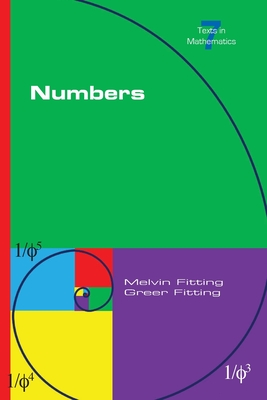Numbers

Numbers
The various number systems are usually taken for granted by most people, and rightly so. But at least once in the career of every person seriously interested in mathematics, they should be looked at with a critical eye. Why were they created, and why are their properties what they are? Numbers is intended to be a readable but rigorous book that addresses these points. Edmund Landau's 1930 book Grundlagen der Analysis (Foundations of Analysis) is still in print, showing the continuing desire for such a book, but it is extraordinarily terse, and is famous for it. It is a long string of definitions and theorems with no informal material at all. We have tried to find a good mix of informality and formal development. We spend much time on motivation, giving informal reasons why a formal development can proceed as it does. Then and only then do we present the formal material. Thus the reader learns not only the mechanism of the number systems, but also how formal mathematics gets created and thought about at a pre-formal level.
The role of set theory and its relationship to the number systems is important, but in a book concentrating on numbers it is rather diversionary. Some set theory is necessary, of course, but the principles needed are simple and straightforward. We assume they are part of the reader's logical machinery and go on from there. A few foundational issues are mentioned, but this is not a book on set theory.
Common pencil-and-paper algorithms for arithmetical computation are discussed along the way. They are, after all, among the great human creations and should be seen as such.
The system of real numbers is often presented using Dedekind cuts or Cauchy sequences. We have chosen an approach whose intuition is more familiar to most: infinite decimals. We develop them in a simple, yet rigorous, way that builds naturally on what people have already had exposure to.
Exercises are included. Some are computational and some are of the supply-a-proof type. If successfully done, the reader will not only have come to know something, but will have come to know that he or she has come to know it.
PRP: 152.93 Lei
Acesta este Prețul Recomandat de Producător. Prețul de vânzare al produsului este afișat mai jos.
122.34Lei
122.34Lei
152.93 LeiLivrare in 2-4 saptamani
Descrierea produsului
The various number systems are usually taken for granted by most people, and rightly so. But at least once in the career of every person seriously interested in mathematics, they should be looked at with a critical eye. Why were they created, and why are their properties what they are? Numbers is intended to be a readable but rigorous book that addresses these points. Edmund Landau's 1930 book Grundlagen der Analysis (Foundations of Analysis) is still in print, showing the continuing desire for such a book, but it is extraordinarily terse, and is famous for it. It is a long string of definitions and theorems with no informal material at all. We have tried to find a good mix of informality and formal development. We spend much time on motivation, giving informal reasons why a formal development can proceed as it does. Then and only then do we present the formal material. Thus the reader learns not only the mechanism of the number systems, but also how formal mathematics gets created and thought about at a pre-formal level.
The role of set theory and its relationship to the number systems is important, but in a book concentrating on numbers it is rather diversionary. Some set theory is necessary, of course, but the principles needed are simple and straightforward. We assume they are part of the reader's logical machinery and go on from there. A few foundational issues are mentioned, but this is not a book on set theory.
Common pencil-and-paper algorithms for arithmetical computation are discussed along the way. They are, after all, among the great human creations and should be seen as such.
The system of real numbers is often presented using Dedekind cuts or Cauchy sequences. We have chosen an approach whose intuition is more familiar to most: infinite decimals. We develop them in a simple, yet rigorous, way that builds naturally on what people have already had exposure to.
Exercises are included. Some are computational and some are of the supply-a-proof type. If successfully done, the reader will not only have come to know something, but will have come to know that he or she has come to know it.
Detaliile produsului









